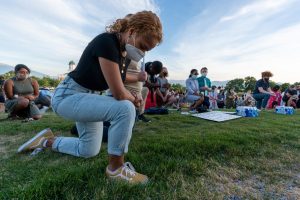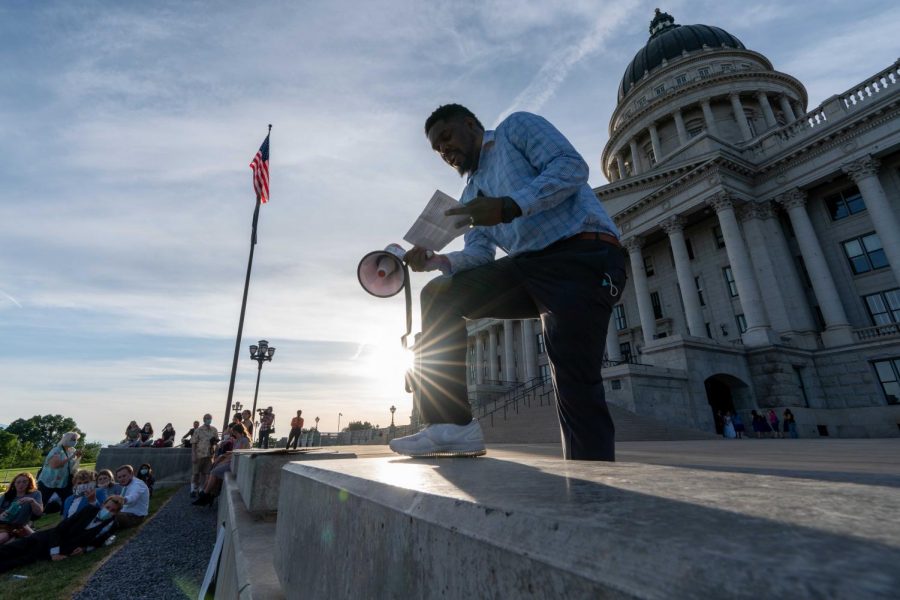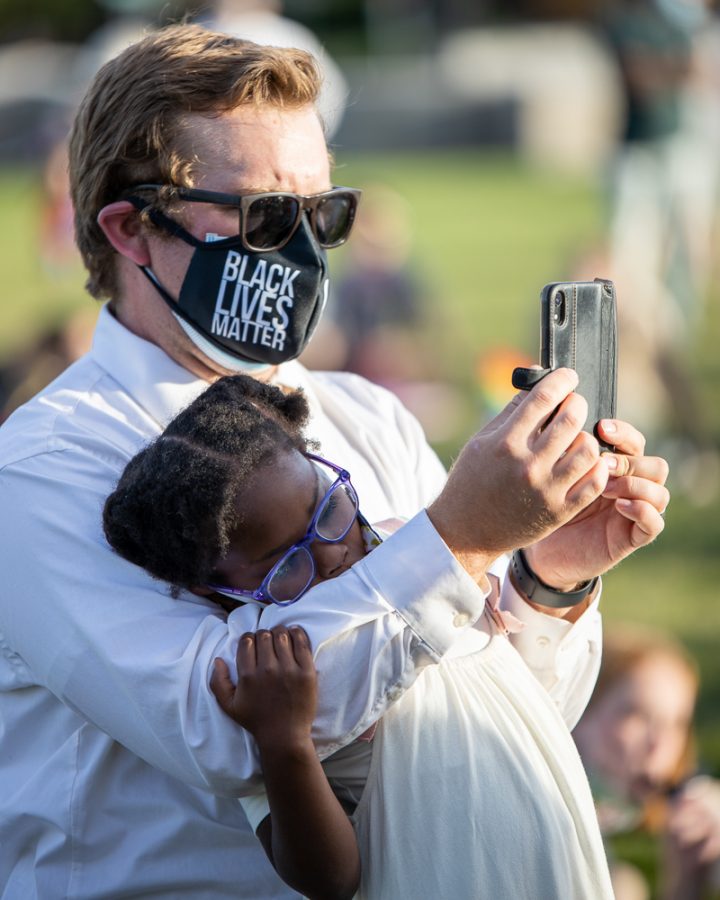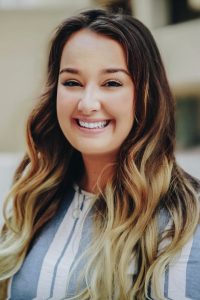Latter-day Saints Hold Event in Support of Black Lives Matter, Organizers Call for Change within Church
A member of the Church of Jesus Christ of Latter-Day Saints at the University of Utah Institute of Religion Building speaks to the crowd gathered for a group march, prayer, and vigil on Sunday, 14 June 2020 to protest the death of George Floyd and other African-American people due to police brutality and systemic racism. The crowd marched from the U to the Utah State Capitol (Photo by Abu Asib | The Daily Utah Chronicle).
June 16, 2020
On June 14, a group of members of the Church of Jesus Christ of Latter-Day Saints marched from the University of Utah’s Institute of Religion building to the Utah State Capitol, joining dozens of other protests in Salt Lake City to denounce racism and police brutality.
“We cannot just sit idly and just hope that things work out. We’ve got to get up and stand for truth,” said Madelaine Lamah, U student and event organizer.
Hannah Fouts, Lamah’s co-organizer, said that one of the main goals of the event was to show the community that standing with the Black community as members of the Church, which is part of living the Church’s teachings of loving one another.
“Really we just want to stand together and show to the community that we really do mean what we say and are doing our best to practice what we preach,” Fouts said.
Once the group arrived at the Capitol, a few speakers came forward to share their experiences as Black members of the Church. Lamah said that the goal was not only to help everyone understand what people of color experience and how they’re affected by racism, but to also inspire participants to actively combat racism within their own communities and spheres of influence.
“I think it’s time that members of the church, get up and act, educate themselves on racism and fight against this injustice, or as our Prophet has said, this sin, that is racism,” Lamah said.
A non-denominational prayer was then given, followed by a candlelight vigil and eight minutes and 46 seconds of silence during which the group members knelt in honor of George Floyd.
On June 1, Russell M. Nelson, President of the Church of Jesus Christ of Latter-Day Saints, shared a post about racism and the recent protests. President Nelson also partnered with three leaders of the National Association for the Advancement of Colored People (NAACP) to publish a piece online and call for national racial harmony.
Lamah felt that the Church’s responses were appropriate but on the safe side.
“Black lives are in danger and it would have been good to see the church take a more specific stance and wants to do something about it, as opposed to just general statements,” Lamah said.
Fout also agreed that more action by the church is needed.
“It’s critical to take off the blindfold, to face our past as a church, which is just full of racism, and just accept the fact that people are imperfect and leaders are imperfect, and a lot of mistakes have been made. Then and only then will we be able to move forward in repairing the damage that’s been done,” Fouts said.
Until 1978, the church did not allow Black members to hold the priesthood — what they believe is power to act in the name of God.
Additionally, the Salt Lake Tribune reported some leaders of the NAACP hope to see more action from the Church than they have in the past two years of partnership.
Wil Colom, special counsel to the NAACP president, said the NAACP is “looking forward to the church doing more to undo the 150 years of damage they did by how they treated African Americans in the church.”
Other Black members of the Church are calling for actions from the church and its members, such as including anti-racism training in the church’s curriculum.

Although she has only been a member for a short time, Lamah has noticed microaggressions from members of the church towards Black members.
“I have observed that sometimes there are certain things that members of the church say coming from a place of ignorance… comments or actions that could negatively impact a Black member of the church,” Lamah said.
She encourages members of the Church everywhere to not sit idly by, but to stand up against racial injustice in their communities.
“For 400 years, we’ve been oppressed, and we need many more years for us to be able to change this. But if we don’t start now, we’re never gonna get there,” Lamah said.










We are not racists in America • Jun 25, 2021 at 3:04 am
This nonsense has to stop , BLM has looted ,stolen , destroyed buildings and business , murdered people , beat people and then blamed it on George Floyd who was just a crisis actor and a criminal , if you look closely at the pictures of George Floyd situation the cops main weight of his body was not on Floyd’s neck but his main weight was on his opposite knee . This was only a set up . They tire town American history statues and real history statues and erected a George Floyd statue , a Black police officer was killed by BLM and there was hardly any mention of him , most police are good . They do not need to be defunded . Defund BLM , the founder of BLM has been evading taxes and has purchased from democrat donations several large multimillion dollar homes .
R Walker • Sep 2, 2020 at 4:55 pm
Because of this I have stopped being LDS for over 60 years i have been a member of the church,now the church has sided with a anti police anti white group. Never thought i’d see this in me life, you have betrayed many of your members to be politically correct ,if this is what the PROPHET thinks then he is a false prophet and has destroyed the church. I will now work against the church and your so called prophet . Look at all the looting your new buddies have done,look at the burning and killing of police .LDS is a traitor to our country and should be labeled a anti American group and should be taxed and held accountable for their actions.
R Walker • Jul 28, 2020 at 5:51 pm
I have been a member of the church for well over 55 years ,I am no longer a member and want nothing to do with the LDS ,to me they are now traitors to our country and should be classified as a terrorist group.
Jim Jackson • Jul 12, 2020 at 8:28 am
Racism is the reason I stopped going to church! It’s throughout everything they do as Mormons. Racism is narcissistic behavior! I understand how to deal with abusive people, or organizations. SOCIAL DISTANCING in full bloom in my home! We want nothing to do with your abusive tactics! Pass if you’re not a racist or black. Just sayin’. Don’t get me totally wrong here. There are a few incredible souls in the church. They are however, few & far between. Not worth the time spent to find a few good people. If my opinion should change, I’ll be sure and update my findings.
Omar • Jul 4, 2020 at 10:40 am
I don’t think the Church of Jesus Christ of Latter Day Saints supports Black Lives Matters, its against racism, but many doctrines of BLM are against the church.
Taylor • Jul 3, 2020 at 12:10 pm
hmmm, is this what causes a break in the church??? Cause while I support blm I don’t support BLM. We tend to be idiots and jump straight in. I hope people know the difference cause you are willing to take the knee for a group of people who are a bottomless pit of hate. They will want more and they won’t be stopped. Is anyone paying attantion to the news? Are you rolling over cause of fear? Cause we have nothing to be sorry for. We serve people and try to raise them through kindness and bringing Christ in their lives. I hope you all pay attention because this is going to cause alot of chaos in the church because of so many well intentioned people.